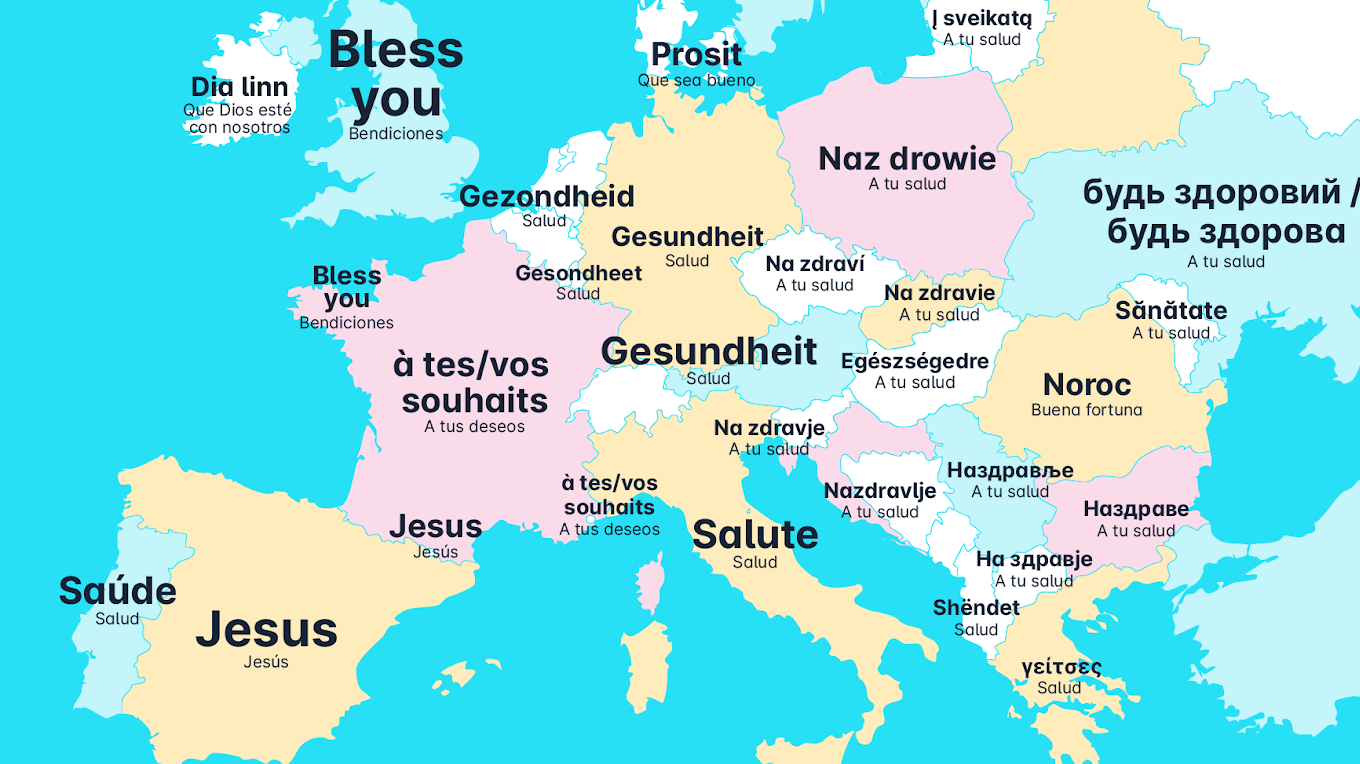News
Nearly two-thirds (64%) of European countries respond to sneezing by congratulating the person who sneezed.
The new map illustrates the protocol for responding to a sneeze in Europe.
Online language learning platform Answer has created a map showing how different countries respond to sneezing in their languages.
Almost two thirds (64%) Many countries in Europe respond to sneezing by sending good wishes to the person who sneezed, usually saying “to your health” or simply “cheers”.
In Dutch, It is customary that if someone sneezes three times, the third time they will react «morgen mooi weer»which is translated as “Tomorrow the weather will be nice.”
The sound of a sneeze is universal. However, the response to sneezing can be very different depending on the country you are in.
How to deal with sneezing, see!
From “bless you” to “gesundheit,” the online educators at Preply have researched sneezing etiquette in 45 European countries to help travelers navigate even the simplest social interactions abroad.
Spanish – “Jesus” or “Salud”
In Spain, when someone sneezes, a popular response is to say “Jesus” or “Salud”.
The ancestors of the Spanish believed that evil spirits came out when they sneezed. With the arrival of Christianity in the country, this was associated with shunning Satan. This is why the term “Jesus” is usually repeated to prevent the ‘devil’ from entering the body.
“Health” is now more commonly used without superstitious connotations. I used to hope that someone wouldn’t get sick.
United Kingdom: “blessed”
In England, saying “bless you” when someone sneezes is commonplace. This custom is believed to originate from the time of the Roman plague, which began in 590 AD. Since sneezing was one of the early symptoms of the plague, it is believed that the Pope ordered that anyone who sneezed should be immediately blessed, in the hope of preventing them from falling ill.
Another explanation states that in ancient times it was believed that sneezing drove the soul from the body, and saying “God bless you” would prevent evil spirits from taking its place.
French: «à tes/vos souhaits»
A common reply to sneezing in French is “à tes/vos souhaits”, which means “as you wish”. It is not known for certain why this is said in France, but some claim that it dates back to ancient times, when changes in breathing were considered a sign that the divine spirit was near, and that is why people wished for good things to happen. .
Italy: “salute”
When someone sneezes, Italians often say “salut”, which literally means “blessing”. It’s basically a way of wishing others good health.
In Italy, they also say “salut” when toasting or encouraging someone.
German: “gesundheit”
In Germany, the most common response to a sneeze is “gesundheit,” which also means “blessing.” Since sneezing is often a precursor to illness, wishing someone well, or telling them you hope they don’t get sick, is seen as a polite response.
Dutch: «gezondheid»
The Netherlands is also following the same trend. A sneeze is also met with “gezondheid”, which again means “cheers”. However, if someone sneezes three times, after the third time they will say “morgen mooi weer”, which means “nice weather tomorrow”.
Iceland: “Guð hjálpi þér”
In Iceland, the typical response to a sneeze is “Guð hjálpi þér,” which means “May God help you.” If you sneeze a second time, you will say “styrki þig,” which means “stand strong,” and if you sneeze a third time, the answer will be “og styðji,” which means “and endure.”
Silvia JohnsonLinguist Answer commented the following:
«By informing yourself and respecting local protocols, you show that you respect and understand cultural differences with others. It shows your willingness to integrate and appreciate different ways of thinking, living, and interacting. Communities are more likely to connect with people who seek to understand and respect their cultural practices, and this can result in better relationships. Additionally, each culture has its own ideas about what constitutes polite and respectful behavior.
Knowing the protocols helps you avoid cultural pitfalls and not offend others due to lack of knowledge or ignorance of their customs. Therefore, as the saying goes, ‘wherever you go, do what you see’, or in other words, when you are in an unknown situation, follow the example of those who already know how to handle it.

“Internet trailblazer. Troublemaker. Passionate alcohol lover. Beer advocate. Zombie ninja.”







